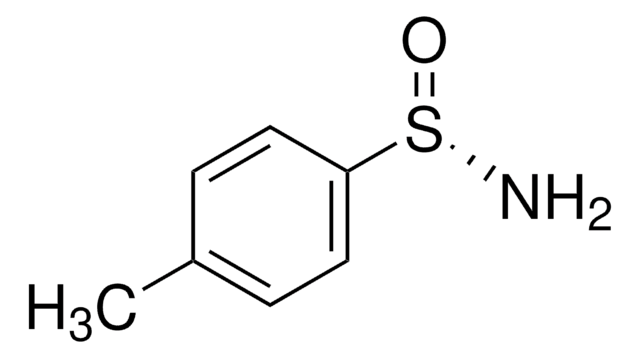236330
p-Toluolsulfonamid
ReagentPlus®, ≥99%
Synonym(e):
4-Methylbenzene-1-sulfonamide, p-Tosylamide
About This Item
Empfohlene Produkte
Qualitätsniveau
Produktlinie
ReagentPlus®
Assay
≥99%
Form
solid
mp (Schmelzpunkt)
134-137 °C (lit.)
SMILES String
Cc1ccc(cc1)S(N)(=O)=O
InChI
1S/C7H9NO2S/c1-6-2-4-7(5-3-6)11(8,9)10/h2-5H,1H3,(H2,8,9,10)
InChIKey
LMYRWZFENFIFIT-UHFFFAOYSA-N
Angaben zum Gen
human ... CA1(759) , CA2(760) , CA5A(763) , CA5B(11238)
Suchen Sie nach ähnlichen Produkten? Aufrufen Leitfaden zum Produktvergleich
Verwandte Kategorien
Allgemeine Beschreibung
Anwendung
- as nucleophile during tetrabutylammonium fluoride (TBAF) catalyzed vinyl aziridine opening reaction
- as reagent during selective aziridination of olefins catalyzed by dirhodium (II) caprolactamate
Rechtliche Hinweise
Lagerklassenschlüssel
11 - Combustible Solids
WGK
WGK 1
Flammpunkt (°F)
395.6 °F - closed cup
Flammpunkt (°C)
202 °C - closed cup
Persönliche Schutzausrüstung
dust mask type N95 (US), Eyeshields, Gloves
Hier finden Sie alle aktuellen Versionen:
Besitzen Sie dieses Produkt bereits?
In der Dokumentenbibliothek finden Sie die Dokumentation zu den Produkten, die Sie kürzlich erworben haben.
Kunden haben sich ebenfalls angesehen
Unser Team von Wissenschaftlern verfügt über Erfahrung in allen Forschungsbereichen einschließlich Life Science, Materialwissenschaften, chemischer Synthese, Chromatographie, Analytik und vielen mehr..
Setzen Sie sich mit dem technischen Dienst in Verbindung.












